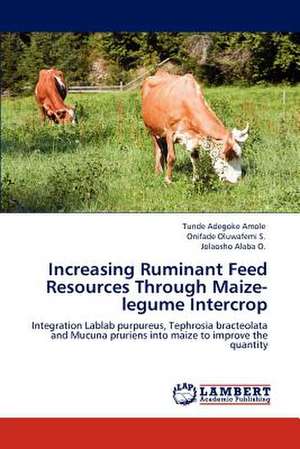Increasing Ruminant Feed Resources Through Maize-legume Intercrop
Autor Tunde Adegoke Amole, Onifade Oluwafemi S., Jolaosho Alaba O.en Limba Engleză Paperback – 23 mai 2012
Preț: 324.01 lei
Nou
Puncte Express: 486
Preț estimativ în valută:
62.01€ • 67.33$ • 52.09£
62.01€ • 67.33$ • 52.09£
Carte tipărită la comandă
Livrare economică 23 aprilie-07 mai
Preluare comenzi: 021 569.72.76
Specificații
ISBN-13: 9783848423071
ISBN-10: 3848423073
Pagini: 96
Dimensiuni: 152 x 229 x 6 mm
Greutate: 0.15 kg
Editura: LAP LAMBERT ACADEMIC PUBLISHING AG & CO KG
Colecția LAP Lambert Academic Publishing
ISBN-10: 3848423073
Pagini: 96
Dimensiuni: 152 x 229 x 6 mm
Greutate: 0.15 kg
Editura: LAP LAMBERT ACADEMIC PUBLISHING AG & CO KG
Colecția LAP Lambert Academic Publishing
Notă biografică
AMOLE, Tunde Adegoke Ph.D, Born 1976 in Nigeria, attended Federal College of Agriculture Akure, Federal College of Agriculture Ibadan (Moor) and Federal University of Agriculture Abeokuta. . He is currently a Research Fellow II at the Institute of Food Security, Environmental Resource and Agricultural Research, University of Agriculture.



